- Home
- JOIN
- History
- Maps
- Treaty Forums
- Purpose of the Peace Treaty Forums
- Forum I Jun 1994
- Forum II Oct 1994
- Forum III Sep 1995
- Forum IV Mar 2000
- Forum V Dec 2006 TR Nobel 100th
- Forum VI Dec 2007 with Dennis Ross
- Forum VII Dec 2008 with Samantha Power
- Forum VIII Dec 2009 Obama's Nobel
- Forum IX Nov 2016 Russia-Japan
- Forum X Nov 2019 Jake Sullivan
- Forum XI Sep 2020 Joseph S. Nye Jr.
- Citizen Diplomacy
- Connections
- Spiritual Aspects
- 2005 100th Anniversary
- 2006 Nobel Prize 100th
- 2007 Commemorations
- 2008 Commemorations
- 2009 Commemorations
- 2010 Portsmouth Peace Treaty Day
- 2011 Order of the Rising Sun
- 2012 100 Years of Cherry Trees
- 2013 Historic Marker Dedicated
- 2014 Sister City Celebrations
- 2015 110th Anniversary
- 2016 Commemorations
- William Chandler & Concord, NH
- Kentaro Kaneko & Dublin, NH
- Asakawa, Dartmouth & Hanover NH
- Carey Family & Creek Farm
- Henry Denison & Lancaster, NH
- John Hay & Newbury, NH
- Japanese Visit Manchester, NH
- Wentworth & New Castle, NH
- Portsmouth: Temple Israel, Rev. Clark
- Sarah Farmer & Eliot, Maine
- Adm. Mead & Kittery, Maine
- Elizabeth Perkins & York, Maine
- Educational Resources
- Living Memorial Project
- Contact Us
- 1713 Treaty

Concord, New Hampshire and the Political Influences on the Selection of Portsmouth
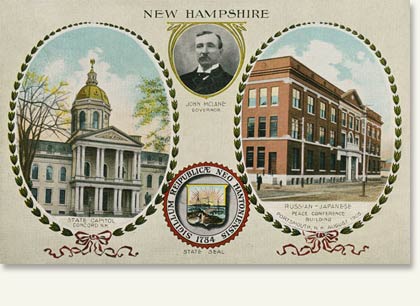
The peace conference that resulted in the Treaty of Portsmouth would never have come to be associated with New Hampshire without the quick action of citizens and state government working together to seize the opportunity.
In June 1905 when word came that the President was looking for an alternative to the summer resorts of Newport and Bar Harbor -- where socialites might snub the Japanese in favor of Russian nobility -- Anderson and Pierce, the owners of the recently-opened Mount Washington Resort at Bretton Woods, NH, offered to host the conference at no charge.
On June 21st, Governor John McLane and the New Hampshire Executive Council quickly approved that suggestion and prepared a formal invitation for consideration by the State Department. The story of the role New Hampshire's Governor John McLane and NH Secretary of State Pearson played in traveling to Washington to deliver their invitation to the Russian and Japanese embassies is related in the History of the Treaty. The letter sent to William Eaton Chandler, former US Senator for the state, former Navy Secretary and friend of Roosevelt's is also part of this record. The Manchester Union's September 9th story and further research in Chandler's papers at the NH Historical Society fill in more details.
Chandler's diary notes receipt of the Governor's letter on June 22nd -- a date that also records a meeting with President Roosevelt, though the recorded topic of discussion was the railroad issue. Meanwhile, Chandler had telegraphed McLane that the hotel owner and NH Secretary Pearson should come to
Meanwhile the same day, Gallinger's telegram of the 22nd to the State Department had been answered by Third Assistant Secretary Herbert H. Peirce who said, "Have submitted matter to President and will give every assistance possible to the representative of the Governor of New Hampshire on his arrival."
By the following Thursday, June 29th, Gallinger was notified by the State Department that Portsmouth might be preferred. Peirce noted that though New Hampshire's invitation had been "most favorably" received that that there were "serious objections" to the distance and security of the White Mountains.
Acting quickly, McLane and Pearson traveled to Portsmouth to seek the assistance of Judge Calvin Page, executor of the Frank Jones Estate and owner of the Wentworth Hotel -- the suitable replacement for the Mount Washington in the preferred location of Portsmouth and its Navy Yard. Judge Page immediately agreed to accommodate the diplomats -- and to absorb the expense -- and Pearson wrote a new letter with the revised details to the State Department on July 1st.
On July 10, 1905 word came that New Hampshire's invitation was accepted and that Peirce would visit Oyster Bay, and then Portsmouth, to make the arrangements.
Thanks to the leadership of the Governor, Executive Council, Secretary of State and Congressional delegation,
As the Manchester Union reported on September 9, 1905 when the ink on the Treaty had dried, "The only place from which an invitation came in the name of a state was New Hampshire."
But who was Chandler?
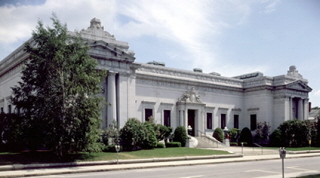 Tuck Library, 30 Park Street
Tuck Library, 30 Park Street
William Eaton Chandler was born on December 28, 1835 on the site at 30 Park Street,
Growing up in the family home in the shadow of the State House, it was perhaps inevitable that
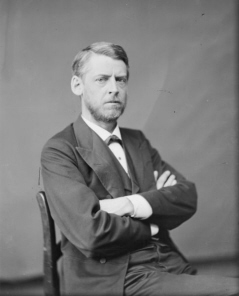
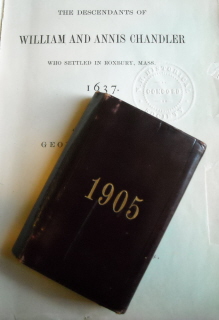
William Eaton Chandler Chandler's pocket diary of 1905.
[Credit: New Hampshire Historical Society]
In 1887
Among other interests they shared a strong belief that a modern Navy was essential to America's position in the world. A letter from Roosevelt, a former Assistant Secretary of the Navy to
In trying to determine why
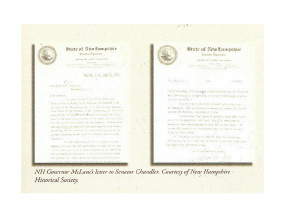
Once the venue was selected, Chandler did not have much active involvement in the proceedings, though he did seem to keep track of developments from his summer home in Waterloo (now a section of Warner, NH). 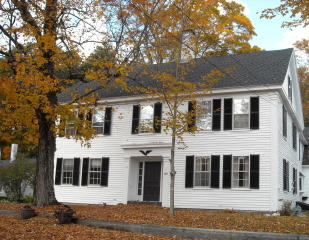 Former home of Sen. Chandler in Waterloo, NH.
Former home of Sen. Chandler in Waterloo, NH.
On August 23rd he and his son, Lloyd (a US Navy officer) traveled by train to Portsmouth where they dined with Page, Denison and Komura and toured the Shipyard with Admiral Mead. Staying at the Rockingham, Chandler, Coolidge and Page made a tour of the coast, visiting Little Boar's Head (in North Hampton) and Ft. Constitution (in New Castle). Of dinner at Wentworth with Denison, Komura, Sato and "another Japanese" he said "Komura talked freely at dinner." He also noted a quick encounter with another figure, who was in Portsmouth to document some of the peace conference details on film: "On 23rd at Rock[ingham] Ho[tel] saw and had a short talk with Thos A. Edison -- had not seen him for 30 years and introduced Lloyd."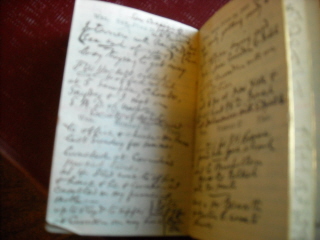

Chandler's 1905 diary [Source: New Hampshire Historical Society] The Rockingham Hotel
The next diary mention of the conference comes on August 30th, "Great news. Peace of Portsmouth" and then on September 6th Chandler records the details of his trip to Lancaster accompanying Denison to his hometown. "To Concord at 9. at 10:45 H.W. Denison arrived from Portsm. To Eagle [Hotel] and then to State House and State Library and about town. At 3:20 Denison and I to Lancaster... Long talk with H.O.Kent [Denison's former employer and host on this visit] ... drove with Kent and his brother Edward about Lancaster and over to Guildhall, D's birthplace. .. At 5 to H.O. Kent's to tea with him, Mrs. Kent, son and daughter." 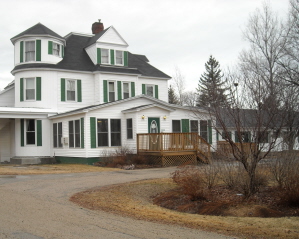 The old Kent homestead in Lancaster.
The old Kent homestead in Lancaster.
Then on September 8th he accompanied Denison to the Mount Washington, finally parting ways on the train on the 9th as Denison continued on to meet up with the rest of the Japanese delegation in New York and Chandler headed home to Waterloo.
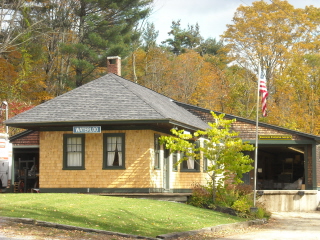 Waterloo, NH train station.
Waterloo, NH train station.
The close friendship between the President and
William E. Chandler suffered a paralytic seizure on March 16, 1917 and died on November 30, 1917 in
© Copyright 2005 Japan-America Society of New Hampshire
NH Web Design | Content Management | Web Hosting